It was snobbery. Nothing more and nothing less.
They’ll tell you otherwise and try to dress it up as something else but it was
snobbery. Pure and simple. You see, we don’t really have that much information
about him. We don’t know when he was born but we do know when he was baptised,
so we can make a bit of a guess about his birthday. We know his father
was a glove-maker made good, so good indeed that he became a local alderman. We
know his mother came from land-owning farming stock and was worth a shilling or
two. We think we know where he may have gone to school and we know he got
married young to an older wife and had three children but he left them and went to live in
London for a while, before coming back home, where he died, leaving a widow and
two daughters. His son had died young, one daughter married a doctor and the
other married a vintner, but neither had any surviving children so his direct
line died with them.
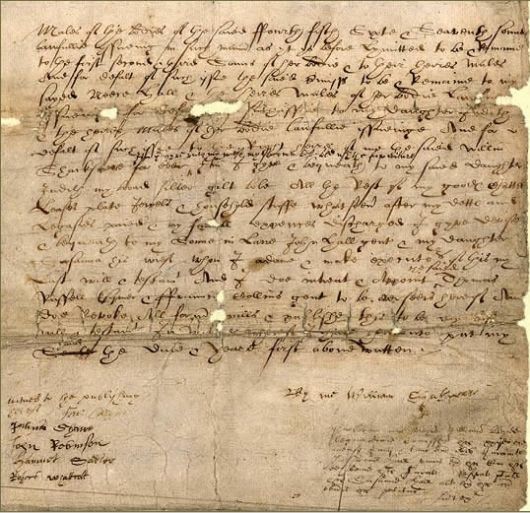 |
| His Last Will and Testament |
We’ve got his will and we know the date on which he died,
and we know where he’s buried. We know a few other bits and bobs but that’s
really the lot, more or less, and it’s not really all that much for the man who
is generally thought to be the best in the world at what he did. And that’s
where the snobbery begins. His old man made gloves, his old mum had a farm, he
didn’t go to university, he ran off and left the wife with three little ones,
so evidently he wasn’t much of a model for the World’s Greatest Writer, which
is what most people would say he was, if you buttonholed them and demanded a
name from them for that particular position. If you haven’t got it yet, I’m
talking about William Shakespeare.
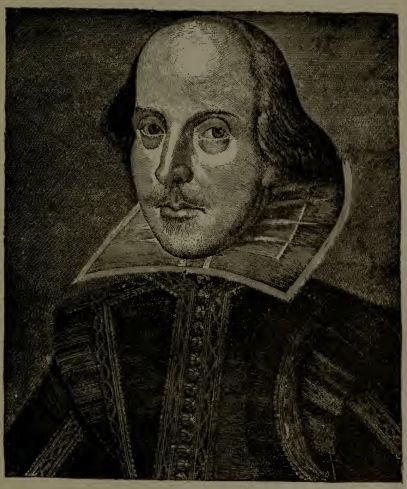 |
| William Shakespeare |
That entire World’s Greatest Writer stuff
began to pick up speed in the nineteenth century and if you want to give it a
name, Bardolatry is as good a name as any. But if you’re going to elevate
someone to such lofty heights then it would be nice if they were, well, a bit special. Not a glover’s son from the Midlands. A Lord would be much better, or
a Prince even. Not a farm girl’s brat from Stratford. A Classical scholar or a
varsity chap at the very least. Goodness me, neither of his parents could even
write their own names, what sort of a provenance of that for Poet Number One. Snobbery, you see. Chap’s not up to snuff, don’t you see, can’t have
been him, must have been somebody else. One of us, don’t you know, not one of
the great unwashed.
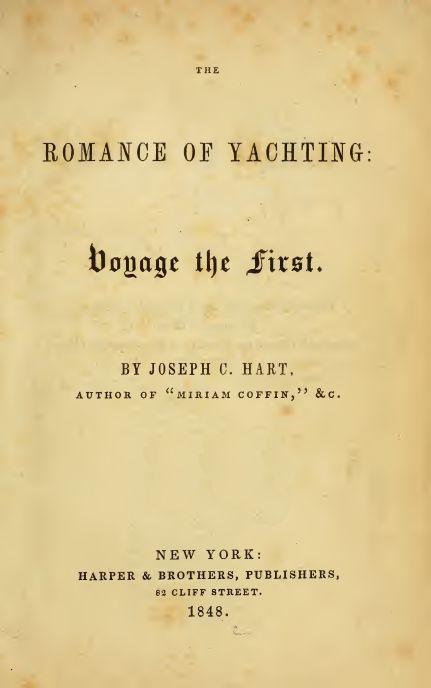 |
| Joseph C Hart - The Romance of Yachting - 1848 |
The strange thing is that this idea first saw the light of
day in book called The Romance of Yachting by Joseph C Hart published in
1848, a book which, despite its title, is a gossipy ramble about a merchant
vessel’s voyage to Spain (It is in print, if hard to find, and worth seeking
out.).
“Alas, Shakespeare! Lethe is upon thee! But if it drown thee it will give up and work the resurrection of better men and more worthy. Thou hast had thy century; they are about having theirs.”
Then, four years later, an
anonymous piece appeared in Chamber’s Edinburgh Journal titled Who
Wrote Shakespeare?, which speculated that an avaricious, opportunistic
Shakespeare may have ‘kept a poet’ who did the actual writing for him.
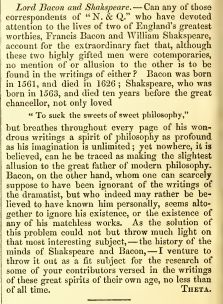 |
| Notes and Queries - November 5 1853 |
An enquiry from ‘Theta’ in Notes and Queries, November 5th
1853, raised the point that whilst Shakespeare and Sir Francis Bacon were
cotemporaries, neither mentions the other and wonders why this might be. This
letter is notable in that it marked the commencement of a series of articles
that ran in N & Q for many, many years.
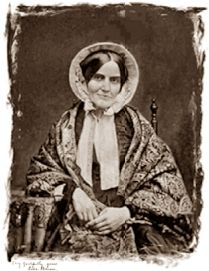 |
| Delia Salter Bacon |
The ‘Was it Shakespeare
or Bacon’ industry really got under way in 1856, when Delia Salter Bacon
published an unsigned article in Putnam’s Monthly magazine ‘William
Shakespeare and his Plays: An Inquiry Concerning Them.’
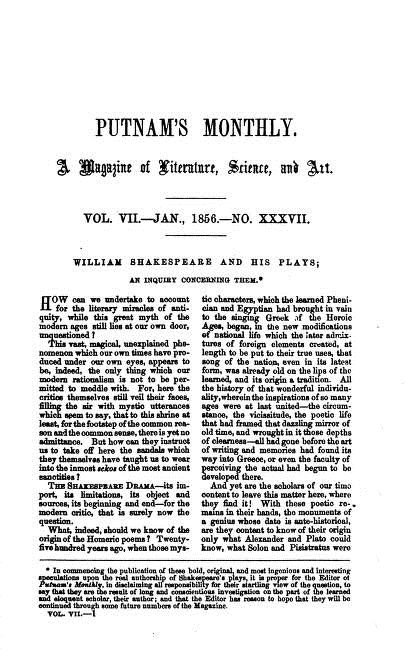 |
| Delia Salter Bacon - William Shakespeare and his Plays: An Inquiry concerning them - Puttnam's Monthly - 1856 |
More about this
gifted woman will follow on another day, but pretty soon everyone and his dog,
it seems, was casting about with theories of their own regarding Bacon and
Shakespeare. You may recall that I mentioned yesterday Bacon’s three ‘distempers’
to learning, one of which was ‘Fantastical Learning’, and this, as it
turns out, is just what Bacon had in mind when brought the subject up himself.
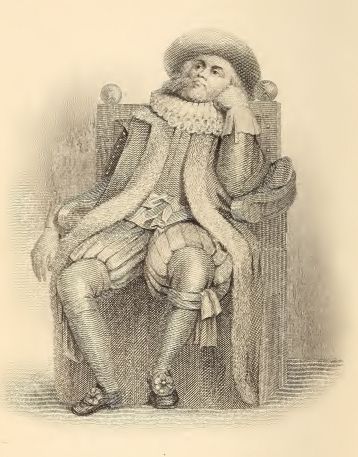 |
| Francis Bacon ponders where all this will end |
Fantastical Learning isn’t real learning; it just pretends to be. It’s
self-referential, it’s circular and dresses itself up in arcane terminology, in
an attempt to baffle to gormless and impress the educated, and it’s empty,
self-important twaddle beyond the normal realms of twaddle. Baconiana is all
that and more; think astrology, reflexology, graphology, phrenology (in fact,
quite a lot of ologies, as it seems), anything that involves crystals and
candles being together in the same place at the same time, homeopathy and
management consultancy, all bundled together, mixed up in a big pot with the
crazy stick and with an extra sprinkle of barmy thrown in just for good
measure, and you just might be a quarter of the way there.
There is craziness
and woo, there’s daft and bonkers, and there is Baconiana. Seriously. I’ve
walked about in this world and seen quite a bit of what’s going on out there
but some of this gobshitery flabbers even my gast. And bear in mind, there’s
also the other stuff that even your average run-of-the-mill Baconian finds just
a tad weird and maybe needs a bit of a rethink.
No comments:
Post a Comment